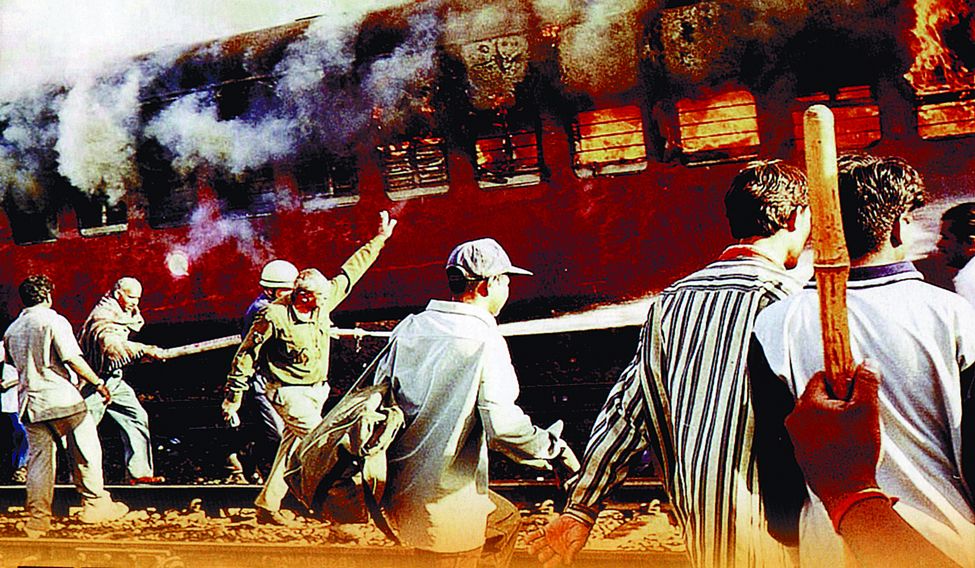


Prime Minister Narendra Modi is set to watch the film 'The Sabarmati Report' on Monday, after lauding it for "revealing the truth" behind the Godhra train tragedy. The film has also been declared tax-free in many BJP-ruled states in a move to promote its portrayal of the "reality" of the incident. After watching the film, Uttar Pradesh CM Yogi Adityanath congratulated the filmmakers and praised the film for exposing certain individuals and their malicious narratives. Starring Vikrant Massey, the film depicts a Hindi journalist who stands up to the system for covering the truth in his reportage.
Godhra Train Tragedy: A Controversial Film Sparks Debate
The Godhra train tragedy of 2002 remains a highly controversial and polarizing event in Indian history. The upcoming film "The Sabarmati Report" has reignited discussions about the incident, prompting political reactions and public debate.
Background:
On February 27, 2002, a train carrying Hindu pilgrims was attacked by a Muslim mob near the town of Godhra in Gujarat. Fifty-nine people were killed in the incident, sparking widespread riots and communal violence across the state. The Gujarat government, led by Narendra Modi at the time, was accused of failing to protect the victims and inciting violence.
The Sabarmati Report Film:
"The Sabarmati Report," directed by Dushyant Pratap Singh, is based on the book of the same name by a Hindi journalist. The film alleges that the Godhra tragedy was a conspiracy orchestrated by certain individuals and groups with malicious intentions. It depicts the protagonist, a journalist, who uncovers the truth despite facing resistance from the system.
Political Reactions:
Prime Minister Narendra Modi has praised the film for "revealing the truth" about Godhra. Several BJP-ruled states have declared it tax-free to promote its portrayal of the incident.
In contrast, opposition parties and critics have accused the film of being politically motivated and distorting the facts. They claim that it is an attempt to whitewash the government's failures and exonerate those responsible for the violence.
FAQs:
1. What was the Godhra train tragedy? It was an attack on a train carrying Hindu pilgrims on February 27, 2002, which led to 59 deaths and widespread communal violence in Gujarat.
2. Who is responsible for the Godhra incident? A Muslim mob carried out the attack, but investigations and trials have been controversial, leading to accusations of a cover-up.
3. What is "The Sabarmati Report"? It is a book and now a film that alleges a conspiracy behind the Godhra tragedy and accuses certain individuals of orchestrating it.
4. Why is "The Sabarmati Report" controversial? It is seen as politically motivated by some and as distorting the facts by others. It has reignited the debate about the Godhra incident and the role of the government at the time.
5. What is the significance of the film's tax-free status in BJP-ruled states? It is a promotional move by the ruling party to encourage the film's distribution and presentation of its version of the Godhra incident.

The Pasighat police in East Siang district, Arunachal Pradesh have arrested the 33-year-old boys' hostel warden of Sanggo English School for sexually assaulting minor students. This came to light when a student was hospitalized for urogenital complications. The incident has sparked outrage from parents and the public, demanding strict action against the accused warden. In response, the Arunachal Pradesh State Human Rights Commission (APSHRC) has taken suo motu cognisance and ordered for a detailed report on the investigation, victim protection, and school management.

Actress Siddiqa Begum, daughter and legal heir of Shah Bano, has served a legal notice on the makers of the upcoming Bollywood film 'Haq'. The notice states that the film's unauthorized depiction of the personal life of Shah Bano without the consent of her legal heirs is a violation of their rights. 'Haq' is based on the landmark 1985 Supreme Court case that granted maintenance to Shah Bano, a Muslim woman, from her divorced husband.

After four years, the 'Darbar Move' tradition in Jammu and Kashmir has been restored, fulfilling the promise of the government and bringing a boost to the economy. National Conference chief Farooq Abdullah expressed happiness, noting that those who sought to separate Jammu and Srinagar have failed. Chief Minister Omar Abdullah received a warm reception and inspected the secretariat premises after the ceremony, as security in the region was heightened for the occasion.

Delhi Legislative Assembly Speaker Vijender Gupta praised Swami Dayanand Saraswati as not just a saint and reformer, but also a pivotal figure in India's freedom struggle. Speaking at the International Arya Samaj Conference, Gupta highlighted how Swami Dayanand's teachings sparked a revolution that led to the nation's independence. The event was attended by esteemed guests including Gujarat Governor Acharya Devvrat and top officials from the Arya Samaj community, all paying tribute to the enduring impact and legacy of Swami Dayanand Saraswati.

The Metro Railway Kolkata has announced a major schedule expansion for its Yellow Line, which runs between Noapara and Jai Hind Bimanbandar (Airport) in Kolkata. Starting from 3 November, weekday operations will increase to 120 services with extended operating hours, providing greater convenience and accessibility to commuters. Weekend travellers will also see a significant frequency upgrade, making travel on Saturdays and Sundays hassle-free. This move is expected to improve the overall public transportation system in the city and benefit the commuters.

Despite some reassurances that online verticals focused on diversity will continue, NBC News has announced a round of layoffs that will impact about 150 employees, or 2% of their workforce. The cuts are said to be a result of cost-cutting measures in preparation for the split of Comcast's cable networks into Versant. This move signifies a shift in priorities for NBC management, prioritizing corporate profits over hard-working members, according to Susan DeCarava, president of The NewsGuild of New York. This change also means that MSNBC will no longer lean on NBC News for newsgathering, with those ties expected to be severed next week.

The Kasibugga Venkateswara Temple in Srikakulam district was the site of a heart-wrenching stampede, causing multiple fatalities and affecting the community deeply. Chief Minister N. Chandrababu Naidu has expressed his sorrow over the unfortunate incident, as well as directing officials to ensure that those injured receive the best medical treatment possible. As local officials and public representatives are called to oversee relief operations, swift action is required to aid those affected and manage the situation effectively.

Indian Prime Minister Narendra Modi inaugurated the Shanti Shikhar Academy for Peaceful World in Raipur, praising the Brahma Kumaris organization for bridging India's ancient wisdom with the world's search for harmony. He credited the group's selfless service and spiritual discipline for their efforts towards universal peace. He positioned the Brahma Kumaris as protectors of India's soul and highlighted India's proactive role in addressing global crises such as disaster relief and environmental threats.

In an act of solidarity and protest, millions of Muslims in India used their Friday prayers to denounce the recent killings that took place in Pahalgam. The news comes amid growing tensions between the Muslim community and the Indian government. Many are viewing this as a sign of unity and determination from the Muslim population in India.

The state of Karnataka, or Kannada Rajyotsava, marked its 69th anniversary with a grand ceremony organized by the district administration in Mangaluru. District in-charge minister Dinesh Gundu Rao paid tribute to the leaders and writers who fought for a unified Kannada state and presented awards to 80 outstanding individuals and organizations. In his address, the minister highlighted the rich cultural and historical heritage of Karnataka and called for a sense of pride among its citizens.